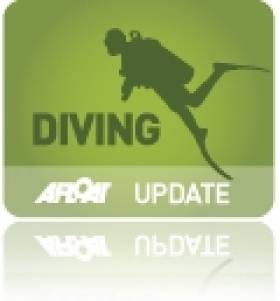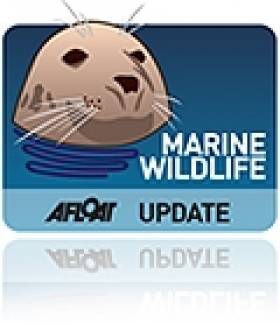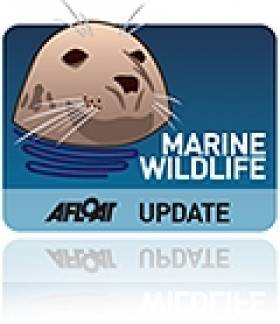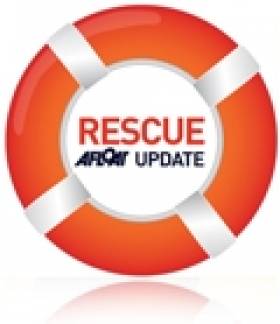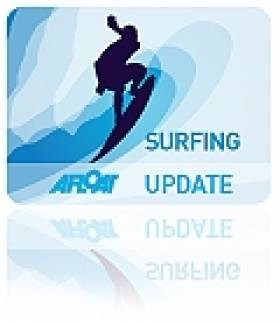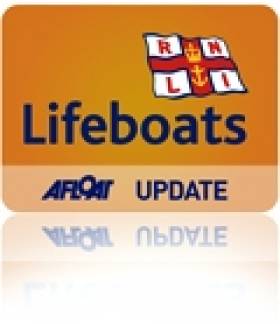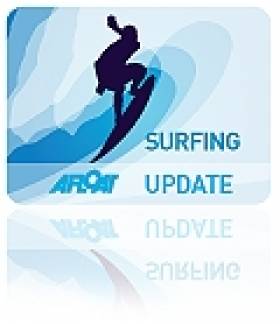Displaying items by tag: Donegal
Dive Ireland takes place this Weekend
CFT who are the national governing body for sports diving in Ireland will hold it's AGM and National Dive Conference at this event.
Some of the speakers include the following:
Jack Ingle Kit configuration
Barry McGill Deep wreck diving off the Donegal Coast
Nigel Motyer Underwater photographer
Tim Carey & Eoin Mc Garry Dive expedition to Asgard II in 2010
Ken O'Sullivan Irish ocean wildlife series Showing January 23rd TG4
Shane McArdle Sports Partnership and what it could mean for CFT clubs
More details and timetable HERE
Sonar Possible Culprit in Whale Death Tragedy
Sonar activity by Royal Navy submarines may have caused the deaths of up to 35 pilot whales off the coast of Co Donegal at the weekend, an expert has claimed.
Dr Simon Berrow of the Irish Whale and Dolphin Group (IWDG) said that naval activity in the area is one possible cause of the tragedy.
"Naval exercises use a low frequency active sonar which is known to affect whales very badly," he told the Belfast Telegraph. "Basically it affects their sonar and causes a gas embolism, like the ‘bends’."
The Telegraph reports that tests are still being carried out to determine if the whales that beached on Rutland Island, near the fishing village of Burtonport, are the same as a group monitored in Scotland's outer Hebrides the previous weekend.
The pilot whales had reportedly been swimming off Co Donegal for the past week before they were found dead.
The Belfast Telegraph has more on the story (with photos) HERE.
Post Mortem on Mass Pilot Whale Strandings Cancelled Due to Bad Weather
Plans to carry out a post-mortem examinations on thirty-five Pilot whales found dead on a beach in Co Donegal yesterday have been cancelled due to bad weather according to Dr. Simon Berrow of the Irish Whale and Dolphin Group (IWDG).
Up to thirty-five Pilot whales were found dead on a beach in Co Donegal. The whales were discovered on Rutland Island near Burton port yesterday afternoon on a beach and have been confirmed as pilot whales, mostly mothers and calves.
A team from the Galway-Mayo Institute of Technology led by Dr Ian O'Connor and the Irish Whale and Dolphin Group are planning to travel to record length, gender and obtain photographs to see if they can be matched to the recently observed Scottish animals. Skin samples and teeth will also be collected for genetics and life-history studies.
According to locals the whales had been seen feeding in the area around Aranmore Island since Tuesday.
A group of around 30 pilot whales were monitored in South Uist in the outer Hebrides, Scotland last weekend for fear of their live-stranding. The IWDG believe it may be the same group.
Pilot whales have a tendency to strand themselves in large numbers and a similar incident occurred in Co Mayo a few years ago. In June Cape Verde islanders abandoned hope for the survival of 92 pilot whales that were found washed up in a mass beaching. In September in New Zealand at least 25 pilot whales died after beaching themselves in a north Wellington bay as rescuers battled to save almost 50 more stranded.
RTE News has pictures HERE
Search Resumes for Donegal Fisherman
The search continues for one of the two-man crew of a Donegal lobster boat that sank off the Inishowen peninsula yesterday morning.
The Irish Times reports that the body of 65-year-old Edward Doherty was recovered from the sea yesterday. His nephew, 41-year-old Robert McLaughlin, was still missing last night when the search was suspended due to bad weather.
The pair's vessel, the 26ft Jennifer, was retrieved by divers south of Malin Head, close to Glengad pier.
In a tragic mirror of the weekend's rescue of two young fishermen off the Co Mayo coast, it's believed that Doherty and McLaughlin had similarly cast off to check on pots.
Malin Head marine rescue centre dispatched the Irish Coast Guard's Sligo-based Sikorsky search-and-rescue helicopter and the RNLI's Lough Swilly and Portrush all-weather lifeboats when the alarm was raised early yesterday.
Some 20 local vessels also joined the search, though they were impeded by heavy rain and choppy seas.
The Marine Casualty Investigation Board is expected to investigate the incident, which is the second in the area in less than three years.
The Irish Times has more on the story HERE.
Rossnowlagh Intercounties This Weekend
Surfers from across the country will be converging on Donegal this weekend for the annual Rossnowlagh Intercounties from 16-17 October.
The All-Ireland event in Ballyshannon is a team competition, and is seen as an important social gathering for Ireland's surfing community.
Current forecasts for Rossnowlagh are showing low waves for the start of the weekend, with the swell expected to pick up on Sunday afternoon - which is sure to heat up the latter stages of the contest.
Man Rescued after Fall from Boat in Ballyshannon
The use of the kill chord and a lifejacket on a boat in Donegal this week meant a man who went over board was able to be rescued quickly by Bundoran Lifeboat
The RNLI was alerted to a person in the water off Creevy Pier in Ballyshannon, Co. Donegal.
The casualty had been thrown from his boat when the steering wheel broke.
He was spotted by two local fishermen who raised the alarm with the Coastguard.
On arrival the local fishermen had retrieved the man from the water. The Lifeboat crew took the casualty onboard and landed him at Creevy where they administered first aid to him.
He was then taken to Sligo General Hospital by ambulance. The rescue helicopter 118 was also on scene and the rescue was coordinated by Malin Head Coastguard.
Speaking after the rescue, Colm Hamrogue, Press Officer for Bundoran Lifeboat commented; "The gentleman was very lucky to be spotted by the local fishermen who raised the alarm. He was wearing his life jacket and had an emergency kill switch on the engine of his boat which went a long way in saving his life.
"He is expected to make a full recovery and I would like to commend the gentleman who was rescued for following sea safety advice by wearing a life jacket and having the necessary emergency kill switch. I would also like to praise the local fishermen for their vital role in this rescue."
Related Safety posts
RNLI Lifeboats in Ireland
Safety News
Rescue News from RNLI Lifeboats in Ireland
Coast Guard News from Ireland
Water Safety News from Ireland
Marine Casualty Investigation Board News
Marine Warnings
Donegal Surfers Celebrate Top Showing at Easkey
John Britton of the famous Rossnowlagh surfing dynasty was among the winners at the Billabong Easkey Open in Co Sligo last weekend. (SCROLL DOWN FOR GREAT YOUTUBE VID)
The national school teacher from Ballyshannon took the senior title home to Donegal, site of next year's European Surfing Championships.
But Britton wasn't the only Donegal resident to enjoy success at Easkey, the final stop of the Irish Championships Tour.
Nicole Morgan from Tullaghan came tops in the women's event, retaining her Irish championship title. And although missing out on the national title, Emmet O’Doherty from Bundoran won out in the stand up paddle.
Junior talent Iarom Madden Travers from Bundoran also showed skill in the open finals, coming third behind Aaron Reid from Sligo and first place Fergal Smith from Mayo.


























